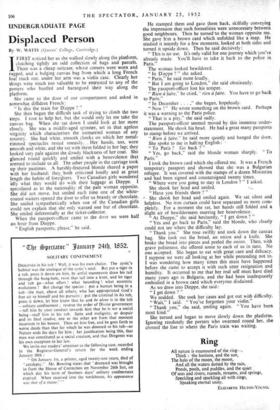UNDERGRADUATE PAGE
Displaced Person
By W. WATTS (Queens' College, Cambridge.)
IFIRST noticed her as she walked slowly along the platform, clutching tightly an odd collection of bags and parcels. There was a cheap suitcase, whose corners were worn and ragged, and a bulging canvas bag from which a long French loaf stuck out; under her arm was a violin case. Clearly her things were much too valuable to be entrusted to any of the porters who bustled and harangued their way along the platform.
She came to the door of our compartment and asked in somewhat diffident French : " Is this the train for Dieppe ? "
She then began the difficult task of trying to climb the two steps. I rose to help her, but she would only let me take the canvas bag. When she sat down I could look at her more closely. She was a middle-aged spinster, set in that ageless virginity which characterises the unmarried woman of any country. She had white, smooth cheeks on which her metal- rimmed spectacles rested uneasily. ., Her hands, too, were smooth and white, and she sat with them folded in her lap; they looked very pale against the dowdy blackness of her coat. She glanced round quickly and smiled with a benevolence that seemed to include us all. The other people in the carriage took up their pastimes. A harshly-featured blonde shared a paper with her husband; the both both criticised loudly and at great length the habits of foreieners. Two Canadian girls wondered idly what they would do with their luggage at Dieppe. I speculated as to the nationality of the pale woman opposite. She did not move, but smiled each time one of the white- coated waiters opened the door to offer us brandy or chocolate. She smiled sympathetically when one of the Canadian girls could not explain that she only wanted one bar of chocolate. She smiled deferentially at the ticket-collector. When the passport-officer came to the door we were half an hour from Dieppe.
" English passports, please," he said. He stamped them and gave them back, skilfully conveying the impression that such formalities were unnecessary between good neighbours. Then be turnecrto the woman opposite me.
She gave him a brown card which unfolded like a map. He studied it intently for a few moments, looked at both sides and turned it upside down. Then he said decisively : " This is no use. It's only-valid for one journey which you've already made. You'll have to take it back to. the police in Paris."
The woman looked bewildered.
" In Dieppe ? " she asked.
" Paris," he said more loudly.
" But I am going to London," she said obstinately.
The passport-officer lost his temper.
" Rien a faire," he cried, " rien a faire. You have to go back to Paris."
" In December . . . ," she began, hopelessly.
" Now !" He wrote something on the brown card. Perhaps it was a warning to the Paris police.
" That is a pity," she said sadly.
The passport-officer seemed moved by this immense under- statement. He shook his head. He had a great many passports to stamp before we arrived.
" Rien a faire," he said more quietly and banged the door.
She spoke to me in halting English : " To Paris ? Go back ? "
" Yes, go back," said the blonde woman sharply. " To Paris."
I took the brown card which she offered me. It was a French temporary passport and showed that she was a Bulgarian refugee. It was covered with the stamps of a dozen Ministries and had been signed and countersigned twenty times.
" Where were you going to stay in London ? " I asked.
She shook her head and smiled.
" Have you friends there ? "
/- She shook her head and smiled again. We sat silent and helpless. No iron curtain could have separated us more com- pletely. For a moment she sat, her hands still folded and a slight air of bewilderment marring her benevolence.
" At Dieppe," she said hesitantly, " I get down ?
" Yes and go back to Paris," said the blonde, who clearly could not see where the difficulty lay.
" Thank you." She rose swiftly and took down the canvas bag. She took out the bread, an onion and a knife. She broke the bread into pieces and peeled the onion. Then, with grave politeness, she offered some to each of us in turn. No one accepted. She began to eat with great care and delicacy.
I suppose we were all looking at her while pretending not to.
I was wondering how many times this must have happened before she came to accept it with such utter resignation and humility. It occurred to me that her real self must have died many years ago in Bulgaria, and she had been inadequately embodied in a brown card which everyone disdained.
As we drew into Dieppe, she said: " I get down ? "
We nodded. She took her cases and got out with difficulty. " Wait," I said. " You've forgotten your violin." " Thank you," she said, smiling again. " You have been most kind."
She turned and began to move slowly down the platform. Ignoring resolutely the porters who swarmed round her, she crossed the line to where the Paris train was waiting.


































 Previous page
Previous page